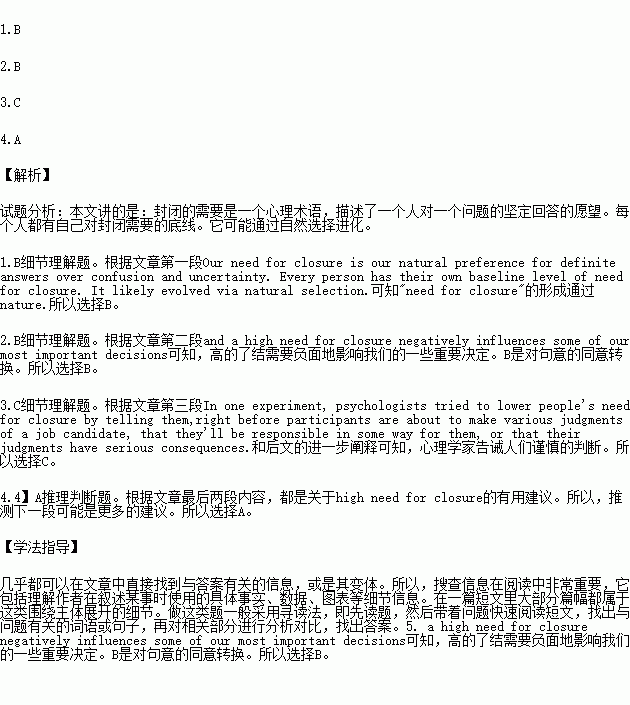题目内容
Need for closure is a psychological term that describes a person's desire for a firm answer to a question. Our need for closure is our natural preference for definite answers over confusion and uncertainty. Every person has their own baseline level of need for closure. It likely evolved via natural selection.
What I find really fascinating is how our need for closure is affected by the situation we're in. Our need for closure rises when we have to act rather than just observe, and it matters much more when we're rushed, or bored, or tired. Any stress can make our discomfort with uncertainty increase, and a high need for closure negatively influences some of our most important decisions: who we decide to trust, whether we admit we're wrong and even how creative we are.
In hiring, for instance, a high need for closure leads people to put far too much weight on their first impression. It's called the Urgency Effect. In one experiment, psychologists tried to lower people's need for closure by telling them, right before participants are about to make various judgments of a job candidate, that they'll be responsible in some way for them, or that their judgments have serious consequences.
In making any big decision, it's not enough just to know that we should take our time. We all know that important decisions shouldn't be rushed. The problem is that we don't keep that advice in mind when it matters. So, one of the best solutions is to formalize the reminders. Before making important decisions, write down not just advantages and disadvantages but what the consequences could be. Also, think about how much pressure you're under. If your need for closure is particularly high that day, it's even more important to think twice.
1.How does "need for closure" probably come into being?
A. By accident. B. By nature.
C. By acquiring. D. By imitating.
2.It can be inferred that a high need for closure ______.
A. brings about more stress
B. leads to not so good decisions
C. causes discomfort and uncertainty
D. promotes one's creativity
3. In the experiment the psychologists reduced participants’ need for closure by telling them to ______.
A. value their first impression
B. be responsible for their boss
C. be cautious about their judgments
D. pay little attention to the consequences
4.What would the author probably discuss in the paragraph that follows?
A. More helpful solutions to high need for closure.
B. Some serious consequences of making decisions.
C. Other approaches to making important decisions.
D. Another strategy to escape the pressures of modern life.
 名校课堂系列答案
名校课堂系列答案

